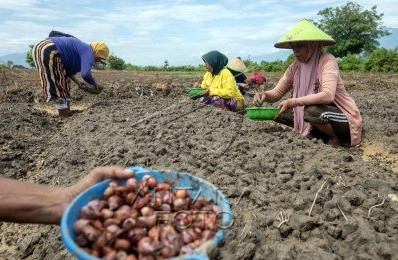Popular Reads
Top Results
Can't find what you're looking for?
View all search resultsPopular Reads
Top Results
Can't find what you're looking for?
View all search resultsHow EUDR could leave Indonesian women farmers behind
Women farmers play a vital role in the country's food production and in the management of renewable natural resources on which Indonesia's food security depends.
Change text size
Gift Premium Articles
to Anyone
T
he Sustainable Development Goals (SDGs) motto, Leave no one behind!, was the very message that women smallholder farmers from across Indonesia emphasized during a recent roadshow to Brussels, London and Rome.
They presented their concerns about the European Union Deforestation Regulation (EUDR), which takes effect this December, and how it will affect their livelihoods. For them, this is not only about trade rules but also about the human faces and real lives behind them.
The stories of these women farmers remind us that sustainability must be pursued with justice, inclusivity and fairness. Otherwise, the very people safeguarding forests and food systems will be the first to be left behind.
The farmers, who came from North Sumatra to Papua, represent four agrifood (agriculture and food) systems, cocoa, rubber, coffee and palm oil, that will be impacted by the EUDR. They visited Brussels and London before ending their tour in Rome.
In response, the Indonesian Embassy, together with the World Farmers’ Organization (WFO) and Competere, brought these matters to the Food and Agriculture Organization (FAO) and on Sept. 19 hosted a roundtable discussion titled Sustainability and the Role of Women Farmers in Agrifood Systems.
The event aimed to show the link between the SDGs and women farmers in agrifood systems, emphasizing the importance of stakeholders hearing these realities directly from Indonesian women farmers.
In Indonesia, women farmers are one of the key backbones of agriculture. They play a vital role in food production and in managing renewable natural resources on which the country’s food security depends. Of the 25.4 million farmers in Indonesia, 24 percent are women. At least 2.8 million farming households are led by women.
Despite this contribution, women farmers face many challenges. The EUDR’s implementation is one of them. The women argued the regulation will significantly affect them, their families, their communities and their livelihoods by risking exclusion from EU supply chains, particularly for Indonesia’s flagship commodities.
They were not asking for the EUDR’s withdrawal, but for balanced measures that put them on equal footing during its implementation.
It is not enough to support women in boosting productivity; it is just as important to remove barriers that limit their role in agrifood systems. From the discussion, three key areas for follow-up emerged.
First, there is a need to explore a workable framework to analyze and mitigate the impact of the EUDR and similar rules on smallholders and women farmers. The FAO, through its deputy legal counsel and chief of development law service, has introduced a new tool, ForestLEX+. It aims to strengthen forest legislation, ensure compliance and align laws with global forest goals and international norms. The FAO has expressed interest in starting work with Indonesia immediately.
Second, capacity building and training must be strengthened to boost sustainable productivity and market access for smallholders and women farmers. The FAO Committee on World Food Security (CFS) issued policy recommendations in 2016 on connecting smallholders to markets, calling for a more enabling environment and greater investment. It is now time to implement these commitments.
Third, access to financial systems tailored to smallholders, particularly women and youth, must improve. This includes access to innovative technologies and technology transfer to help them mitigate risks from the EUDR. Financial inclusion is not charity but investment. Tailored schemes for women farmers can unlock their potential to adopt innovations, reach better markets and contribute to sustainable supply chains. This could be pursued through South-South and Triangular Cooperation among the EU, FAO and EUDR-impacted countries.
In conclusion, the roundtable facilitated the exchange of experiences, best practices and expertise among all parties. Most importantly, it helped foster understanding of how to achieve the SDGs alongside the EUDR while not neglecting the hands that feed the world.
***
The writer is alternate chairperson of the Food Agriculture Organization/World Food Program Appeals Committee and member of FAO Committee on Constitutional and Legal Matters. The views expressed are his own.











